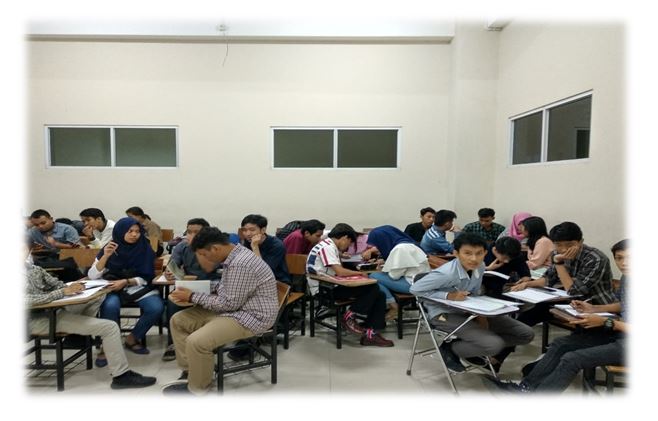Genre-Based Approach: Can It Improve the Informatics Engineering Students’ Writing Skill?
DOI:
https://doi.org/10.21070/jees.v5i1.395Keywords:
ESP, Genre-based Approach, Informatics EngineeringAbstract
Because instructional process in English for Specific Purpose (ESP) context is oriented to students’ academic and professional settings within discourse community, challenges appear. Learning language and learning language are directed to improving students’ language skills to survive the 21st century. On the other hand, score-documentations proved that the students performed low skills; especially writing skill. This study aimed at improving the students’ skill in writing explanation text by using Genre-Based Approach (GBA) to Informatics Engineering students of a private university in South, Indonesia. Classroom Action Research (CAR) was conducted to the third semester students of the university within two cycles. To validate the findings, writing test, observation and questionnaire were employed. The test result proved implementing GBA improved the classroom’s average score from 54 to 59.95 in cycle 1. This improvement was supported by the students’ engagement and enthusiasm to the instructional process as suggested by questionnaire and observation respectively. Further, the implementation of cycle 2 revealed the average score improved from 59.5 to 70.5. This score improvement is followed by the students’ agility and cooperativeness during the instructional process. This concludes that implementing GBA can improve the students’ skill in writing explanation text. This finding is expected to give insight for teachers to undoubtedly using GBA in English for specific purposes context.
HIGHLIGHTS:
- The instructional practice of teaching English for informatics engineering students in the private university still focuses on form-based mastery.
- The informatics engineering students are eager and high-determinate to learn language skills especially writing in collaborative framework.
Downloads
References
Aunurrahman, A., Hamied, F. A., and Emilia, E. (2017). A Joint Construction Practice in an Academic Writing Course in an Indonesian University Context.
Bawarshi, A. S., Reiff, M., and Jo (2010). Genre: An introduction to history, theory, research, and pedagogy . page 4, West Lafayete IN. Parlor Press.
Belcher, D. D. (2004). 8. TRENDS IN TEACHING ENGLISH FOR SPECIFIC PURPOSES. Annual Review of Applied Linguistics, 24(1):165–186.
Bratcher, S. and Ryan, L. (2004). Evaluating Children’s Writing, A Hanbook of Grading Choices for Classroom Teachers: Second Edition. Lawrence Erlbaum Associates, Inc, New Jersey.
Broad, B. (2003). What We Really Value, Beyond Rubrics in Teaching and Assessing Writing. Utah State University Press, Utah.
Bruce, I. (2008). Academic Writing and Genre: A Systemic Analysis. Continuum: London.
Coffin, C. and Donohue, J. P. (2012). Academic Literacies and systemic functional linguistics: How do they relate? Journal of English for Academic Purposes, 11(1):64–75.
Darani, P., Ahmadi, Talebinejad, M., and Reza (2014). Evaluation of In-House and Global ESP Textbooks: A Genre-Based Approach. International Association for Research on Textbooks and Educational Media, 6(1):21–37.
Dirgayasa, I. and Wy (2014). The Development of English Writing Learning Material through a Genre Based Approach for English Department at University. Proceedings of ISELT FBS. Universitas Negeri Padang, 2(1):200–209.
Emilia, E. (2011). Pendekatan Genre-Based Approach dalam Pengajaran Bahasa Inggris: Petunjuk untuk Guru. Rizqi Press, Bandung.
Firkins, A., Forey, G., and Sengupta, S. (2007). Teaching writing to low proficiency EFL students. ELT Journal, 61(4):341–352.
Harmer, J. (2000). The Practice of English Language Teaching. Pearson, Cambridge.
Hutchinsson, E. (2005). Narrative writing. Saddleback Educational Publishing, New York.
Hyland, K. (2003). Genre-based pedagogies: A social response to process. Journal of Second Language Writing, 12(1):17–29.
Knapp, P. and Watkins, M. (2005). Genre, Text, Grammar: Technologies for Teaching and Assessing Writing. UNSW Press, Sydney.
Leeuwen, T. V. (2005). Introducing Social Semiotics. London: Routledge.
Nunan, D. (1993). Understanding Language Classrooms: A Guide for Teacherinitiated. Action. Applied Linguistics, 14(1):107–118.
Nunan, D. (2003). Practical English language Teaching. Longman, New York.
Rahman, M. and Mojibur (2011). Genre-based Writing Instruction: Implications in ESP Classroom. English for Specific Purposes World, 3(11):1–9.
Rochberg, F. (2004). The Heavenly Writing; Divination, Horoscopy, and Astronomy in Mesopotamian Culture. Cambridge University Press, Cambridge.
Sadeghi, B., Hassani, M. T., and Hemmati, M. R. (2013). The Effects of Genre-based Instruction on ESP Learners’ Reading Comprehension. Theory and Practice in Language Studies, 3(6):1009–1020.
Santosa, R. (2011). Logika Wacana: Analisis Hubungan Konjungtif dengan Pendekatan Linguistik Sistemik Fungsional. UNS Press, Surakarta.
Setyowati, L., Sukmawa, S., and Latief, M. A. (2017). Solving the Students’ Problems in Writing Argumentative Essay Through the Provision of Planning. Celt: A Journal of Culture, English Language Teaching & Literature, 17(1):86–86.
Ueasiriphan, T., , and and, S. T. (2019). The Effects of Genre-Based Teaching on Enhancement of Thai Engineers’ Technical Writing Ability. International Journal of Instruction, 12(2):723–738.
Vorvilas, G., Karalis, T., and & R Ravanis, K. (2011). A Genre-Based Framework for Constructing Multimodal Content for Learning Objects. Asian Journal of Computer Science and Information Technology, 1(1):1–8.

Published
How to Cite
Issue
Section
License
Copyright (c) 2020 Nur Najibah Sukmawati, Sukma Septian Nasution

This work is licensed under a Creative Commons Attribution 4.0 International License.







